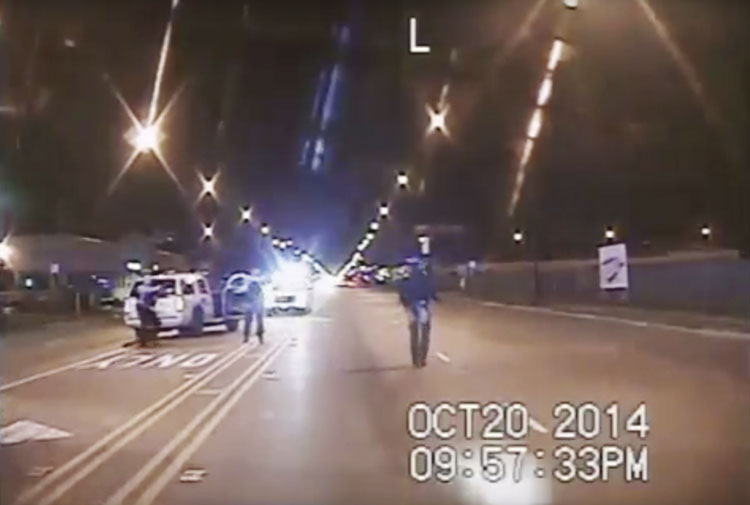Jurors find Chicago police officer guilty of second-degree murder in shooting death of black teen

Dashcam video showed Laquan McDonald walking in the street before Officer Jason Van Dyke shot him 16 times. AP Photo.
A Chicago police officer was found guilty of second-degree murder on Friday for the 2014 shooting death of 17-year-old Laquan McDonald. The officer, Jason Van Dyke, shot McDonald 16 times in an incident caught on dashcam video.
Jurors in Cook County, Illinois, also convicted Van Dyke on 16 counts of aggravated battery with a firearm and acquitted him on a charge of official misconduct. He faces a sentence of at least six years in prison, the Chicago Tribune reports. Van Dyke is white and McDonald was black.
McDonald was carrying a knife when he was shot by police responding to a call about a man with a knife breaking into trucks. WBEZ posted a video that included audio of a police dispatcher calling for Tasers and dashcam video showing McDonald was not walking toward police when he was shot. (Story continues below video.)
Judge Vincent Gaughan explained before the reading of the verdict that a conviction for second-degree murder requires proof of first-degree murder along with a mitigating factor. He had given jurors the second-degree murder option if they found the shooting was unjustified but Van Dyke believed he was acting reasonably, the New York Times reports.
Gaughan revoked Van Dyke’s bond after the verdict.
A judge had ordered release of the dashcam video in November 2015 in a Freedom of Information Act lawsuit filed by an independent journalist. Van Dyke was charged with first-degree murder the same day the video was released. He was indicted the next month and has been suspended without pay since then.
The video release led to protests, followed by changes in the Chicago Police Department. Now the department releases video of police shootings within 60 days; gives all patrol officers body cameras and Tasers; and has stricter guidelines on the use of force.
Van Dyke had testified that he shot McDonald because he thought the youth would attack him after ignoring commands to drop the knife. Van Dyke also said he had acted in accord with his police training.
In closing arguments, prosecutors said Van Dyke recounted to a psychologist a comment made to his partner before arriving at the scene. “We’re going to have to shoot the guy,” Van Dyke had said. Prosecutors said the statement was evidence of intent, the Chicago Tribune reports. They also said that Van Dyke could have held his fire and checked on the location of the squad car approaching the scene with a Taser.
“Someone needed to arrest Laquan McDonald, not stop him with a hail of gunfire,” said special prosecutor Joseph McMahon.
Van Dyke’s lead lawyer, Daniel Herbert, said the shooting was a tragedy that could have been avoided if McDonald had dropped his knife.
Some businesses and schools in the Chicago area made plans to close early before the verdict was announced, in anticipation of protests, the Tribune reports.
Related article:
ABA Journal: “Chicago special prosecutor’s career nearly came to a premature end”



